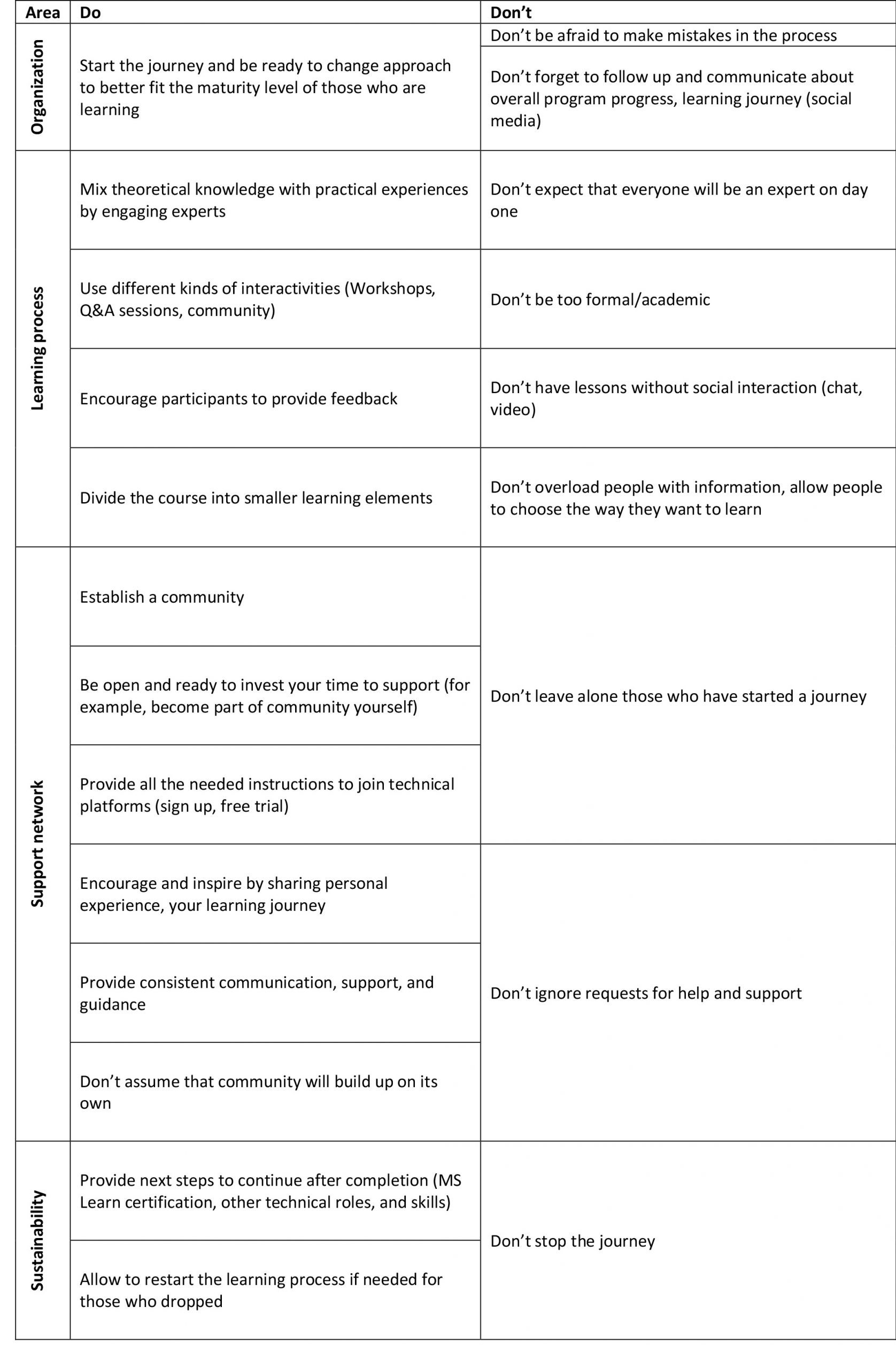
In my previous articles Skills for the digital era and Learning Digital: Early starters advantage I have written about the importance of digital skilling. And now, looking back, I can see even more importance – the demand for skills is growing as digital transformation accelerates[1] and we have seen many examples where technology combined with the right skills enables organizations to drive innovation. Digital skills not only help to excel in business, they are also a social stability driver and improve employment opportunities and inclusion.[2] Research conducted by Microsoft CEE in 2020 showed that companies in CEE which have adopted cloud technologies see 35% more demand for digitally skilled people vs non-adopters.
We also see more and more that successful organizations prioritize skills as much as technology – American Chamber of Commerce in Latvia conducted a survey in 2020 that showed that 91% of respondents had in-house employee training programs in the last 12 months and the top required skills were:
- Digital skills at various levels, e.g. data management, technical skills;
- Leadership skills, e.g. change management, strategic thinking;
- Project management skills, e.g. IT project management;
- Agile/Scrum; and
- Language skills in customer service, e.g. English, Russian[3].
It is clear the importance of digital upskilling is here, and we also see more and more initiatives around the globe that are aiming to reduce the skills gap. But why are we still facing a problem that was recognized a year ago, that businesses are heading towards a skills crunch? Only 3.5% of CEE employees fully met digital skills needs in 2020. My answer is that digital upskilling is a journey that will take time to deliver tangible results and both the private and public sectors need to create sustainable support and motivation network for those who are ready to start, or have already started, the journey.
In 2020 Microsoft launched the Global Skilling Initiative (GSI) in addition to other upskilling and reskilling programs[4]. Programs are available for everyone and are free of charge – all that the individual needs are interest, motivation, and time that they can spend on learning new digital skills. However, talking to people we also understood that there are groups at different maturity levels in their digital upskilling journey. Some are aware of what they want to learn and are motivated, whereas some are not sure what they need to learn to open new opportunities[5] According to Peter Hollins we can all be in different stages regarding a particular subject and it is clear that in different stages we will need different approaches for learning and also different support.
To support the learning of modern knowledge, Microsoft, within GSI, in cooperation with the Innovation Centre of the University of Latvia LUMIC, the ISM University of Management and Economics in Vilnius, and the Estonian Business School in Tallinn have created a personal development program, the “Baltic Digital Skills Development Program”[6]. This allowed to provide instructor-led training and community support for students.
Digital skills are a broad area, that’s why the focus on something that is in demand is important to make the first steps and see the first tangible results. In case of the Baltic Digital Skills Development Program, we took two subjects that are in highest demand in the labour market, data analysis and low-code/no-code.
As for every learning process, it was important to define learning methods that would be applied as there is different knowledge retention percentage to different methods:
- (Listening to lectures (5% retention);
- Reading (5%);
- Audio/visual learning (20%);
- Demonstration (30%);
- Group discussion (50%);
- Real-life experience (75%); and
- Teaching others about your real-life experience (90%).
As MS Learn and LinkedIn offers mainly the first 3 methods, in the Baltic Digital Skills Development Program we wanted to increase the engagement and retention percentage by adding demonstrations and group discussions. Theoretical lessons were complemented by Microsoft partner companies presenting real life examples.
But as we see, the biggest retention is from real-life experience (applying acquired skills in practice) and teaching others. That’s why as a part of Baltic Digital Skills Development Program we launched virtual internship program for those who have successfully passed the final exam[7].
There were almost 10 thousand people who started the program and after 8 weeks one or both courses were finished with more than 1000 people successfully passing the exam. One can say that there were very many of those who dropped out, but I see it from a different side – there were people who already from the very first attempt were able to motivate themselves and move to the next step in their digital upskilling journey. There were also many more who needed more motivation and support to finish this first step, and even more of those who needed to start the journey.
What are the lessons from our skilling journey?
- Find the right partners (Universities; Industry; NGOs; State Employment agencies) who share the same vision and are ready to cooperate.
- Define focus area (Business and Data Analysis; Low-code/No-code in our case) – do not start with everything for everyone. The more specific you will be for your target audience, the more efficient the program will be.
- Define learning process (Self-learning and Instructor-led learning) – It is important to find the best mix of methods used that will be productive with your audience (think about motivation of those people, maturity, former experience).
- Establish community – already from the very beginning think about the support network for those who will start they journey: A community that can answer questions and provide additional motivation.
- Create an opportunity to practice – remember about retention percentage of different learning methods – training without practice will not be so efficient.
I have also distilled Do’s and Don’ts from my discussion with Skilling project team.

Continued upskilling is a journey and I like to see it as process where everyone can build their skills stack (the idea is that you learn new skills, often unrelated, and then combine them to make yourself more efficient, or valuable[8]) from digital skills, specific industry skills, and, of course, a variety of social skills. And both private and public sector players need to help as many people as possible to start and continue those journeys
[1] COVID-19 digital transformation & technology | McKinsey
[2] Digital skills critical for jobs and social inclusion (unesco.org)
[3] Immediate and targeted investments in upskilling and reskilling are critical — American Chamber of Commerce in Latvia (amcham.lv)
[4] Microsoft launches initiative to help 25 million people worldwide acquire the digital skills needed in a COVID-19 economy – The Official Microsoft Blog
[5] Peter Hollins The Science of Rapid Skill Acquisition, Advanced Methods to Learn, Remember, and Master New Skills and Information [Second Edition]
[6] About Programme (lu.lv)
[7] Virtual internships (lu.lv)
[8] Skill stacking: Instead of mastering one skill, build a skill set (theladders.com)





